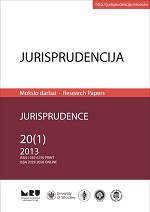Žmogaus genetinių duomenų apsaugos teisiniai ir etiniai aspektai
Legislative and Ethical Peculiarities of Human Genetic Data Protection
Author(s): Danielius SerapinasSubject(s): Law, Constitution, Jurisprudence
Published by: Mykolas Romeris University
Keywords: genetic data; protection; ethics; discrimination
Summary/Abstract: Genetics is a biomedical science that investigates heredity, variability, occurrence of genetic diseases and their prevention. Genetic science has many fields of science, which deal with different genetic processes, methods, aspects and fields of application. The genetic research in Europe related to the individual as the main subject of the research is exposed to a wide range of ethical and legal issues. From the developments in genetic science other sciences have evolved, thanks to which the modern world is able to protect the genetic information of data, and to receive the sanction while ignoring the laws of such data. However, many problems still persist in the field of protection of personal genetic information, such as regulatory standards, the inviolability of an individual, the assurance of freedom and privacy of information. This manuscript attempts to reveal the main aspects of genetic human data protection, to research conduct regulations, ethics and issues related to the protection of individuals, such as protection of privacy, discrimination, confidentiality, etc. The article mainly focuses on the Conventions and Protocols elaborated by the Council of Europe because of its role in bioethics and focus on human rights. The author examined the documents such as the Convention on Human Rights and Biomedicine, the Additional Protocol to the Convention on Human Rights and Biomedicine concerning Biomedical Research, Directive 95/46/EC of the European Parliament and of the Council of 24 October 1995 on the protection of individuals with regard to the processing of personal data and on the free movement of such data and others. Genetic discrimination is strictly forbidden by international conventions and declarations, which means that discrimination on the grounds of personal genetic information (diseases, abnormalities) is not possible in all areas, including employment and insurance. However, individuals face some problems in getting a job due to the publicity and information disclosure to their employers, or in increasing the amount of insurance premiums. However, the disclosure of genetic information may have relevant, statutory consequences and the victims may apply to court for defending these rights. It is essential to protect genetic rights, as any form of discrimination against a person on the grounds of their genetic heritage is prohibited and intervention in the health field or disclosure of such information is only possible after the person concerned has given their free and informed consent.
Journal: Jurisprudencija
- Issue Year: 20/2013
- Issue No: 1
- Page Range: 165-179
- Page Count: 15
- Language: Lithuanian

